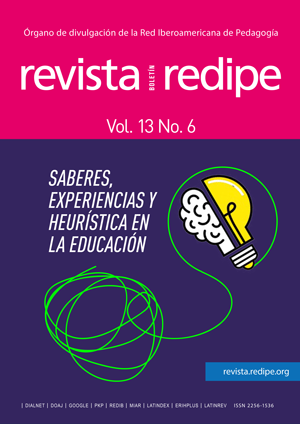Towards a heuristic of the research question in educational matters from an epistemological and hermeneutic reflection
Main Article Content
Keywords
Heuristics, Hermeneutic, Dialectical, Educational Research
Abstract
The adoption of an analytical perspective in light of scientific realism and of a hermeneuticdialectical foundation of research questions offers a critical focus in the epistemic dimension of education. From this perspective, and on the basis of an epistemological critic as method, we seek a comprehensive understanding of pedagogical phenomena and processes on the basis of research questions, allowing for broader awareness of the multiple dimensions that take part in the configuration of the educational. In this sense, a heuristic proposal is presented for the formulation of research questions with the aim of providing a practical-reflective guide that can develop a critical and transformative vision of education. The fundamental steps of this heuristic can constitute theoretical elements to foster an analysis of educational problems and forge new opportunities for educational action. By this approach a research practice oriented towards social transformation through acknowledgment of complexity and diversity of perspectives that integrate pedagogical understanding is encouraged. As last resort, the combination of a critical glance on realism from the epistemological and a hermeneuticdialectical foundation in the formation of research questions aimed at contributing to the development of significant knowledge of the educational procedure in the subject of research.
References
Bauer, H. H. (1994). Scientific literacy and the Myth of the Scientific method [La alfabetización científica y el mito del método científico.] University of Illinois Press.
Beuchot, M. (2015). Tratado de hermenéutica analógica. Hacia un nuevo modelo de interpretación (5ª ed.). Universidad Nacional Autónoma de México.
Beuchot, M. (2000). Heurística y hermenéutica. En A. Velasco Gómez (Ed.). El concepto de heurística en las ciencias sociales y las humanidades (pp.101-123). Siglo XXI Editores- Universidad Nacional Autónoma de México.
Bohm, D. (trad. en 2022). Sobre el diálogo (D. González Raga & F. Mora, Trad. 6ª. ed.). Kairós (Trabajo original publicado en 1966.)
Bunge, M. (2000). La investigación científica. Siglo XXI Editores.
Campos Hernández, M. A. (2021). Didáctica de la investigación educativa. Universidad Nacional Autónoma de México; Instituto de Investigaciones sobre la Educación y la Universidad.
Campos Hernández, M. A. (2019). Investigar la educación. El compromiso del Saber. Universidad Nacional Autónoma de México; Instituto de Investigaciones sobre la Educación y la Universidad.
Casillas Avalos, I. (2019). Carácter epistemológico de la pedagogía.
En M. G. García Casanova (Ed.). Aproximaciones filosóficas al estudio de la educación (pp.441-462). Universidad Nacional Autónoma de México.
Chalmers (trad. en 1982). ¿Qué es esa cosa llamada ciencia? una valoración de la naturaleza y el estatuto de la ciencia y sus métodos. Siglo XXI Editores. (Trabajo original publicado en 1976).
Díaz Rodríguez, J. A. (2024). Hacia una fundamentación hermenéutico-platónica de la pregunta de investigación en el campo educativo. Revista Boletín REDIPE 13(5) 120-130. https://doi. org/10.36260/n3g7h887
Dewitt, R. (2018). Worldviews. An Introduction to the History and Philosophy of Science (3ª ed.) [Visiones del mundo. Una introducción a la historia y filosofía de la ciencia]. Wiley-Blackwell.
Feyerabend, P. (trad. en 2007). Tratado contra el método (D. Ribes, Trad., 5ª ed.). Tecnos (Trabajo original publicado en 1975).
Feyerabend, P. (1985). Realism and instrumentalists. Comments on the logic of factual support. En Realism, Rationalism, and Scientific Method [Realismo, racionalismo y método científico] (pp.176-202). Cambridge University Press.
Feyerabend, P. (trad. en 1982). La ciencia en una sociedad libre (Trad. A. Elena). Siglo XXI Editores. (Trabajo original publicado en 1978).
Fraassen, B. C. van (1980). The Scientific Image [La imagen científica]. Clarendon Press.
Gadamer, H. G. (trad. en 2000). La educación es educarse (Trad. F. Pereña Blasi). Paidós.
Gadamer, H. G. (trad. en 1977) Verdad y método. (M. García Baro, Trad.; Vol. 1). Ediciones Sígueme. (Trabajo original publicado en 1975).
Habermas, J. (trad. en 2023). Conocimiento e interés (Trad. M. Jiménez, et al.). Taurus. (Trabajo original publicado en 1968).
Laudan, L. (1978). Progres and Its Problems, Towards a Theory of Scientific Growth [El progreso y sus problemas, hacia una teoría del crecimiento científico]. University of California Press.
Kuhn, T. (trad. en 2006). La estructura de las revoluciones científicas (Trad. C. Solís Santos; 3ª ed.). Fondo de Cultura Económica. (Obra original publicada en 1962).
Mamsoor, N. (2020). Feyreabend’s Epistemological Anarchism. How Science Works and Its Importance for Science Education. [El anarquismo epistemológico de Feyerabend. Cómo funciona la ciencia y su importancia para la ciencia de la educación] Springer.
Ortega Ruiz, P. (2021). Educación, valores y experiencia. Revista Boletín REDIPE 10(2) 28-37 https://doi.org/10.36260/rbr. v10i2.1192
Plá, S. (2022). Investigar la educación desde la educación. Universidad Nacional Autónoma de México; Instituto de Investigaciones sobre la Educación y la Universidad; Ediciones Morata.
Ramos Galarza, C. A. (2016). La pregunta de investigación. Revista UNIFÉ 24(1) 23- 31. https://revistas.unife.edu.pe/
Suppe, F. (1977). The wanning of the Weltanschauungen Views. En F. Suppe (Ed.). The Structure of Scientific Theories (2ª ed.) (pp.633-649) [La estructura de las teorías científicas]. University of Illinois Press.
Touriñan López, J. M. (2023). Signification of Knowledge of Education as a Methodology Principle of Pedagogical Research and the Relevance of Common Activity. Revista Boletín REDIPE 12(1) 17-63 https://doi.org/10.36260/rbr. v12i1.1928
Velasco Gómez, A. (2000). Tradiciones naturalistas y hermenéuticas en la filosofía de las ciencias sociales. Universidad Nacional Autónoma de México.



